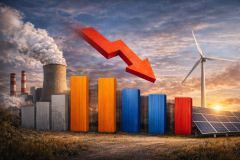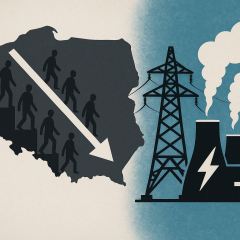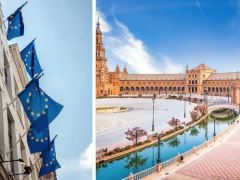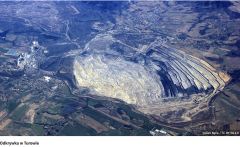BlackRock, the asset-management company, started to redirect its investments. The company is 75% passive and 25% active. That means the company built the portfolio tracking indices. It's an easy way to diversify investments. Now fossil-fuel stocks have begun to drag down portfolios. So it’s possible that we will see changes in capital allocation more quickly than we see changes to the climate itself. Pure coal players such as Polish Bogdanka and PGG are now excluded from the active funds managed by BlackRock.
Today, after more than a year of increasing pressure from climate activists, investors, legislators, and thought leaders, BlackRock CEO Larry Fink, in his highly-anticipated annual letter to CEOs and to clients, announced a sweeping new set of policies which aim to put climate change and sustainability at the center of BlackRock’s business model. BlackRock is the world’s largest asset manager with almost $7 trillion in assets under management as of Q3 2019.
The announcement is a major shift for BlackRock, which previously had failed to take meaningful action on climate, and is a very important step in the right direction as the world faces increasing risk from climate change.
In this analysis we will examine and respond to the core pieces of BlackRock’s announcement (coal exclusion, engagement & voting, ESG, index sustainability, and disclosures), as well as identify important issues missing from this announcement.
The bottom line: Massive capital shifts away from fossil fuels and deforestation-risk commodities are necessary to mitigate the worst of the climate crisis and set the world on a path toward sustainability. As the world’s largest asset manager, BlackRock must play a leading role in, as Larry Fink put it, ‘fundamentally reshaping finance to deal with climate change.’
Today’s announcement begins that reshaping, but is not enough. BlackRock must implement additional shifts of capital out of fossil fuels. It must acknowledge and take action on the fact that its portfolios, which still contain fossil fuels and deforestation-drivers, are actively contributing to climate change and thus contribute the risk that climate change poses to the global financial system. It must clearly define what it means by “sustainable” and improve its criteria around ESG to be Paris-compliant or better. And it must engage with companies in a concrete, transparent, time-bound way with consequences for inaction like voting against board members.
With that said, there is still a lot to celebrate in BlackRock’s announcement, as well as many lingering questions and areas that BlackRock needs to improve:
Coal Divestment:
Summary:
-
Companies with 25% or higher revenue from thermal coal production excluded from all actively managed funds.
-
Thermal coal out of all ESG funds.
-
No direct thermal coal investments through alternatives business at same exclusion (25% revenues from thermal coal production).
What we like:
-
Largest divestment policy ever in terms of “policy applied to AUM” at $1.8 Trillion (although stronger divestment policies at large investors like AXA have produced more actual shifts in capital)
-
No BlackRock alternative investments products will have any new investment in coal.
-
BlackRock moving thermal coal out of ESG funds. However, there is again a need to define thermal coal (Is it just producers, or utilities and others?) and thresholds for exclusion given that Larry Fink states: “We believe that ESG benchmarks should exclude businesses with high ESG risk such as thermal coal and we are engaging with index providers on this topic.”
What we still have questions about:
-
Does the policy apply beyond coal producers, i.e. mining companies? A threshold of 25% on “thermal coal production”- implies this could include heavy coal utilities, like coal exclusion policies at many other companies. This is key.
-
Will BlackRock commit to revising its thermal coal policy in line with the criteria of the Global Coal Exit List, which will require the company to ratchet down its thresholds over time? (For example 101 companies under a 25% revenue threshold still plan new coal mines).
-
There is no timeline set for the commitment to phase out thermal coal from ESG products (while the actively managed funds coal divestment commitment is mid 2020). Additionally there is no definition for “thermal coal company” nor threshold in the ESG commitment.
What needs to change:
-
If an exclusion threshold uses a revenue metric, as BlackRock has, instead of a production metric, this can create a problem when this metric is applied to assess utilities. This is especially problematic in places where coal is uneconomical (e.g. certain utilities would slip through the cracks at 25% revenue, due to the uneconomical nature of the business, but would be on the exclusion list using a 25% production metric).
-
Coal exclusion appears to be just focused on producers not utilities or any other sector in the coal supply chain.
-
This thermal coal policy should follow the GCEL which is the best in class standard. It includes relative, absolute and expansion criteria.
Engagement/Voting on Climate:
Summary:
-
Mapped engagement priorities to specific UN Sustainable Development Goals.
-
Incorporated key performance indicators in engagement policies, providing clarity on expectations for companies.
-
Joined Climate Action 100+.
-
Enhanced transparency on: high profile vote explanations (immediately) and topics discussed during each engagement with companies (yearly).
What we like:
-
Positive steps forward on vote explanations, transparency on engagement, and voting guidelines.
-
CA100+ can be a positive step forward if paired with specific action.
-
A direct acknowledgement that BlackRock will vote out management if there is not enough progress from companies on climate issue.
What we still have questions about:
-
What time-bound limits does BlackRock have with its engagement approach?
-
What are the clear bright lines that will empower BlackRock to do what it is promising on shareholder engagement - voting against recalcitrant management on climate issues, including resolutions and board of directors votes?
-
Upon what criteria will these priorities and guidelines be based?
What needs to change:
-
Setting time-bound limits for engagement. BlackRock has said it does not have endless patience for engagement; neither does the climate.
-
BlackRock must now draw clear lines for fossil fuel and fossil-adjacent companies to align their operations to our net-zero future, and vote accordingly.
ESG:
Summary:
-
All active funds fully “ESG integrated” and managed for exposure to ESG risks. This includes reducing exposure to higher-risk industries like thermal coal.
-
Improved BlackRock internal ESG analysis via Aladdin.
-
Thermal coal (following BlackRock’s criteria) out of ESG funds.
-
Doubling BlackRock offerings of ESG ETFs.
-
Working with index providers to expand and improve the universe of sustainable indexes
-
Transparent disclosure of carbon footprint of all mutual funds
What we like:
-
Thermal coal out of ESG products.
-
More ESG offerings including sustainable versions of flagship funds.
-
Portfolio diversity while still maintaining sustainable mandates.
-
More comprehensive company-wide ESG risk analysis.
What we still have questions about:
-
How is BlackRock defining criteria for ESG funds? Is that criteria actually aligned with - or even go beyond - the goals of the Paris Agreement?
-
How does BlackRock plan to increase marketing of these ESG funds. According to IEEFA, in mid-2019, ESG funds only represented less than 1% of BlackRock’s total business.
-
BlackRock calls for transparency of sustainability characteristics of all products, but how is the sustainability criteria defined and how does it compare with other external criteria? How is it monitoring against internal greenwashing?
What needs to change:
-
Marketed sustainable funds should be exactly that, sustainable. BlackRock’s newest commitments center around excluding certain thermal coal producers from ESG products. For these funds to be truly sustainable, ESG products should not include any companies which are expanding any fossil fuel extraction, production, or consumption, or directly contributing to global deforestation.
-
BlackRock should continue to publicly call for universal common definitions of “sustainability” and should support efforts, including the European green taxonomy, which aim to set a consistent, transparent, and high bar for “sustainable” ESG definitions. Those definitions should be standardized and BlackRock should confirm it will apply the highest bar definition across all regions and the entirety of its business.
Climate Risk Disclosure:
Summary:
-
Ask companies to give a clear analysis of their preparedness to transition their business model to address risks associated with climate change.
-
BlackRock’s head of sustainability Brian Deese commented that companies need to address their business’ physical limitations related to climate change as well as their social license to continue to operate.
-
Commits to active and transparent engagement with companies to ensure adequate disclosure of climate-related risks.
What we like:
-
As one of the biggest shareholders in most companies, BlackRock asking for not only climate risk analysis but also transition plans sends an important signal that has the potential to rapidly change the landscape.
-
Let’s hear it for the power of grassroots movements! An acknowledgment that protest risk and social license to operate are critical factors to consider for any company operating in 2020.
What we still have questions about:
-
BlackRock has acknowledged existing climate risk disclosure framework/methodology, including TCFD and SASB. Both have their strengths and drawbacks. How will BlackRock work towards a universal disclosure framework which adequately assesses the real climate risk?
-
How will BlackRock evaluate the transition plans of individual companies and what is the criteria to evaluate? For example, will transition plans be evaluated only on minimizing climate risk to the company? Or will transition plans also be evaluated on the company’s compliance with climate science and the 1.5 degree Paris agreement?
What needs to change:
-
Without a standardized and enforceable methodology to evaluate climate-related risk on a company level, disclosures continues to be ripe for greenwashing.
-
BlackRock must ask companies to disclose their transition plans in accordance to a 1.5 degree Paris compliance, not just climate-related risk analysis.
-
BlackRock must also disclose its own exposure to climate risk across all its portfolios.
Sustainable Index Investing
Summary:
-
Larry Finks boldly states that he wants to create “Sustainability as Our [BlackRock’s] Standard Offering” by fundamentally reshaping finance
-
Blackrock commits to offer sustainable versions of BlackRock flagship model portfolios, including Target Allocation range of models
-
Larry notes that “Many more steps will follow to make sustainable investments the standard.”
What we like:
-
The direction of travel is right. Beginning a transition of having sustainability as the standard product offering, across portfolios, is indeed the goal. But the details matter.
-
Starting this transition by offering sustainable versions of popular funds, not niche products, and aiming to meet the needs of clients.
-
Signalling interest in changes to laws that are onerous towards this sustainability transition, like the current implementation of ERISA in the United States (see Fink’s statement in this video).
What we still have questions about:
-
How exactly does BlackRock define “sustainable”? How does this definition compare to product offerings that are fossil-fuel free? Does it take into account strong action on deforestation and indigenous rights?
-
There are hints that BlackRock is moving toward meeting our demand for making fossil-fuel and deforestation free funds the default, but the letter is vague about that. What does its effort to “make sustainable investments the standard” look like in practice? What is the timeline?
What needs to change:
-
Creating more options is great. But the impact is minimal unless clients buy it, and BlackRock has a lot to say about whether that happens:
-
Will this be used just for new investments or will BlackRock proactively encourage clients to switch existing investments to these new sustainable products?
-
Is there a goal of a particular amount of AUM that BlackRock has for client uptake with the products that track this benchmark?
-
Coal/fossil/deforestation-free should be the default option for clients.
Gaps in the announcement:
More Capital Shifts Out of Financially Risky Fossil Fuels
Reducing exposure to high-risk sectors with heightened ESG risk does not end with thermal coal. Parts of the oil and gas sector are especially risky, both from a transition risk and because of their outsized role in driving climate change. Companies with significant reserves in Arctic oil and gas drilling, along with tar sands operations, have been targeted for divestment by other large financial institutions, including global asset managers BNP Paribas AM and AXA IM. These sectors should be next for BlackRock’s capital shifts in its actively managed products.
Deforestation Risk and Indigenous Rights
Deforestation is the second-largest driver of climate change. The Amazon fires last fall and the wildfires in Australia today show the immense risk to the climate, forests, and indigenous peoples that deforestation-risk commodities pose. Consistently bad actors like Brazilian beef giant JBS won’t change without strong, concrete action from asset managers like BlackRock.BlackRock has not made clear whether deforestation risk or indigenous rights will be part of BlackRock’s new engagement and voting priorities.
-
Will BlackRock incorporate deforestation risk and indigenous rights into its engagement and voting priorities?
-
Will BlackRock establish an agribusiness and/or an indigenous rights policy?
-
If so, will it make this public?
Lobbying on Climate Risk
BlackRock has enormous lobbying power, which up until now it has tended to use to increase its access to markets and reduce regulations on the asset management industry.Now that it has declared that sustainability is at the center of its operations, how will it use its lobbying arm to ensure that its goal of “fundamentally reshaping finance to deal with climate change” is possible under U.S. (and other jurisdictions) law and regulation?
-
Will BlackRock push regulators to make it easier for investment firms to offer sustainable products as their core products?
-
Will BlackRock push regulators to require under law the things it is asking investee companies to do, like disclose climate impacts and transition to a climate-friendly business model?
Climate change poses a serious risk to the financial system, as Fink has acknowledged in commentary framing this announcement. How will BlackRock incorporate recognition of that risk into its lobbying priorities? In the U.S. for example:
-
Will BlackRock urge the Federal Reserve to join the Network on the Greening of the Financial System?
-
Will BlackRock encourage the Financial Stability Oversight Council to increase oversight on climate-related risks to the financial system?
-
Will BlackRock signal that it welcomes climate stress testing of large financial institutions, including itself?
BlackRock’s Own Disclosures
BlackRock has committed to pushing companies for certain disclosures (see above) but has not committed to disclosing its own climate risk across its portfolios.
Will BlackRock disclose its own exposure to climate risk across its entire set of portfolios, both active and index?
SOURCE: https://www.blackrocksbigproblem.com/post/our-in-depth-analysis-of-blackrock-s-climate-announcement
Authors of this Analysis include:
Diana Best - Senior Strategist for the Sunrise Project
Ben Cushing - Sierra Club Campaign Representative - Beyond Dirty Fuels
Moira Birss - Finance Campaign Director for Amazon Watch
Casey Harrell - Campaigns Director for Sunrise Project








